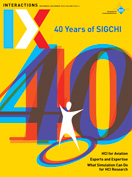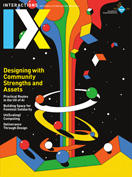Authors: Jonathan Grudin
Posted: Fri, November 21, 2014 - 3:18:54
Issues that elicit passionate and unpredictable views arrive, fast and furious:
- The right to be forgotten
- Facebook emotion manipulation
- Online bullying and cyber hate
- Institutional Review Boards
- Open publishing
- The impact of technology on jobs
Is consensus eroding?
Has HCI broadened its scope to encompass polarizing topics?
Are social and mainstream media surfacing differences that once were hidden?
After briefly reviewing these topics, I’ll look at controversies that arose in years past—but back then it was two or three per decade, not one every six months. Unless I’ve forgotten some, the field is more contentious in its maturity.
Recent controversies
Expunging digital trails. The European Union ruled that people and organizations can prevent search engines from pointing to some past accounts of their activity. This might favor those with financial resources or high motivation due to particularly unsavory histories, but it could counter an erosion of privacy. That said, it doesn’t expunge records, it just puts a hurt on (non-European) search engine companies. Will it work? The BBC now lists articles that search engines must avoid, which could increase the attention the articles receive.
The Facebook study. Researchers set off a firestorm when they claimed to induce “emotional contagion” by manipulating Facebook news feeds. Whether or not the study showed emotional contagion [1], it revealed that Facebook quietly manipulates its news feed. The use of A/B testing to measure advertising effectiveness is not a secret, but this went further. If happy people prove more likely to click on ads, could Facebook systematically suppress grumpy peoples’ posts? Many in the HCI community defended the study as advancing our understanding; I could not predict which side a colleague would come down on. I was a bit torn myself. I’m a strong advocate for science, but what if one of the unidentified half million people barraged with selectively negative friends’ posts dropped out and another leapt from a bridge? The “contagion” metaphor isn’t comforting.
Prior approval to conduct research. Did the Facebook terms of agreement constituted ethically adequate “informed consent” by those in the study? The limited involvement of an Institutional Review Board (IRB) was challenged, which brings us to another ongoing debate. IRB approval is increasingly a prerequisite for academic research in health and social science, intended to avoid harm to study subjects and legal risk for research institutions. It seems reasonable, but in practice, researchers can wear down examiners and get questionable studies approved, and worthwhile research can be impeded or halted by excessive documentation requirements.
The Facebook study team included academic researchers. Industry researchers are often exempt from IRB review, which can irritate academics. I have experienced both sides. I’ve seen impressive, constructive reviews in clinical medicine. In behavioral and social science, I’ve seen good research impeded. Could a PhD based on human subject observation or experimentation become a license to practice, as a surgeon obtains a license, with onerous IRB reviews invoked only after cases of “malpractice”?
Hate speech and bullying vs. free expression. A few well-publicized teenage suicides after aggression in online forums led to legislation and pressure on social media platform and search engine developers to eliminate unwanted, disturbing online confrontations. But it’s complicated: What is offensive in one culture or subculture may not be in another. Offensiveness can depend on the speaker—“only Catholics can criticize the Pope,” but on the Internet no one knows you’re a Catholic. Some people find it entertaining to insult and horrify others—“trolls” exhibit poor taste, but is it hate speech?
We want to protect the young, but how? When a child is the target and a parent is known, should abuse be reported? Some kids can handle it and would rather not involve their parents. Some researchers argue that children with abusive parents might be worse off if a parent is brought in. This topic calls for research, but legislation is being enacted and software developers can’t wait. People take different sides with considerable passion.
Open publishing. Publishing becomes technically easier every year. Why not cut publishers out of the loop? Many who have looked closely respond, “Because publishers oversee details that busy professionals would rather avoid.” Nevertheless, ACM is under pressure despite its very permeable firewall: Individual and conference “author-izer” features permit free worldwide access, and thousands of institutions buy relatively inexpensive ACM site licenses without grumbling. Open access was embraced first in mathematics and physics, where peer review plays a smaller role, and in biology and medicine, where leading journals are owned by for-profit publishers. Within HCI and computer science, calls for open access are strongest in regions that rely less on professional societies for publication.
Publishers sometimes spend profits in constructive ways. ACM scans pre-digital content that has no commercial value into its useful digital library archive and supports educational outreach to disadvantaged communities. Some for-profit publishers have trail-blazed interactive multimedia and other features in journals. Publishers do shoulder tasks that over-taxed volunteers won’t.
The impact of technology on jobs. In 1960, J.C.R. Licklider proposed a “symbiosis” between people and computers. Intelligent computers will eventually require no interface to people, he said, but until then it will be exciting. Many of his colleagues in 1960 believed that by 1980 or 1990, ultra-intelligent machines would put all humans out of work—starting with HCI professionals. No one now thinks that will happen by 1980 or 1990, but some believe it will happen by 2020 or 2030.
A recent Pew Internet survey found people evenly split. Digital technology was credited for the low-unemployment economy prior to 2007, so why not blame high tech for our lingering recession? That’s easier than taking action, such as employing people to repair crumbling infrastructures.
In September, a Churchill Club economic forum in San Francisco focused on automation and jobs. The economists, mostly former presidential advisors, noted that in the past, new jobs came along when technology wiped out major vocations. The technologists were less uniformly sanguine. A Singularity University representative forecast epidemic unemployment within five years. The president of SRI more reassuringly predicted that it would take 15 years for machines to put us all out of work. I contributed a passage written by economics Nobel Laureate and computer scientist Herb Simon in 1960, appearing in his book The Shape of Automation for Men and Management: “Technologically, machines will be capable, within 20 years, of doing any work that a man can do.”
Past controversies: Beyond lies the Web
The HCI world was once simple. We advocated for users. Now it’s more complicated. Users hope to complete a transaction quickly and leave; a website designer aims to keep them on the site, just as supermarket designers place frequently purchased items in far corners linked by aisles brimming with temptation.
Some disagreements in CHI’s first 30 years didn’t rise to prominence. For example, many privately berated standards as an obstacle to progress, whereas a minority considered standards integral to progress, claiming that researchers generally favor standards at all system levels other than the one they are researching. Social media weren’t there to surface such discussions and mainstream media rarely touched on technology use. However, controversy was in fact rare. Program committees desperately sought panel discussions that would generate genuine debate. We almost invariably failed: After some playful posturing by panelists, good-natured agreement prevailed.
There were exceptions. Should copyright apply to user interfaces? Pamela Samuelson organized CHI debates on this in 1989 and 1991. Ben Shneiderman advocated legal punishments and testified in a major trial. On the other side, many including Samuelson worried that letting a lawyer’s nose into the HCI tent would lead to tears.
In spirited 1995 and 1997 CHI debates, Shneiderman took strong positions against AI and its natural-language-understanding manifestation [2]. His opponents were not mainstream CHI figures and the audience generally aligned with Ben. AI competed with HCI for the hearts and minds of funders and students. NLU dominated government funding for human interaction but never established a significant foothold in CHI, where most of us knew that NLU was going nowhere anytime soon.
Today, there is some openness to discussing values and action research. Back then, CHI avoided political or value-laden content. We were engineers! One might privately lean left or libertarian, but the tilt was scrupulously excised from written work. Ben Shneiderman was a lonely voice when he advocated that CHI engage on societal issues.
The prevailing view was that HCI must eschew any hint of emotional appeal to get a seat at the table with hardware and software engineers, designers and managers. Ben’s calls to action were balanced by his conservative reductionist methodology: There is no problem with experiments that more experiments won’t solve.
The most heated controversies were over methods. Psychologists trained in formal experimentation, engineers focused on quantitative assessment, and those who saw numbers as essential to getting seats at the table were hostile to both “quick and dirty” (but often effective) usability methods and qualitative field research.
In 1985, in the first volume of the journal Human Computer Interaction, Stu Card and Alan Newell said that HCI should toughen up because “hard science” (mathematical and technical) always drives out “soft science.” Jack Carroll and Robert Campbell subsequently responded that this was a bankrupt argument, that CHI should expand its approaches to acquire better understanding of fundamental issues. In 1998, again in the journal HCI, Wayne Gray and Marilyn Salzman strongly criticized five influential studies that had contrasted usability methods. They drew 60 pages of responses from 11 leading researchers.
The methodological arguments subsided. Today’s broader scope may reflect greater tolerance for diverse methods, or maybe the tide turned—advocates of formal methods shifted to other conferences and journals.
Concluding observation
Today contention flares up, but public attention soon moves on. Is there any sustained progress? Some topics are explored in workshops or small conferences. A Dagstuhl workshop made progress on open publishing, but we did not produce a full report and uninformed arguments continue to surface. Some people with strong feelings aren’t motivated to dig deeply; some with a deep understanding don’t have the patience to repeatedly counter emotional positions.
The vast digital social cosmos that surfaces controversies may diminish our sense of empowerment to resolve them. We touch antennae briefly and continue on our paths.
Endnotes
1. The study showed that news feeds that contain negative words are more likely to elicit negative responses. For example, if people respond to “I’m feeling bad about my nasty manager” by saying “I’m sorry you’re feeling bad” and “Tough luck that you got one of the nasty ones,” the authors would conclude that negative emotion spread. Other explanations are plausible. When my friend is unhappy, I may sympathize and avoid mentioning that I’m happy, as in the responses above.
2. A record of the CHI 1997 debate, “Intelligent software agents vs. user-controlled direct manipulation,” is easily found online. A trace of the more elusive CHI 1995 debate can be found by searching on its title, “Interface Styles: Direct Manipulation Versus Social Interactions.”
Thanks to Clayton Lewis for reminding me of a couple controversies and to Audrey Desjardins for suggestions that improved this post and for her steady shepherding of Interactions online blogs.
Posted in: on Fri, November 21, 2014 - 3:18:54
Jonathan Grudin
View All Jonathan Grudin's Posts






Post Comment
No Comments Found